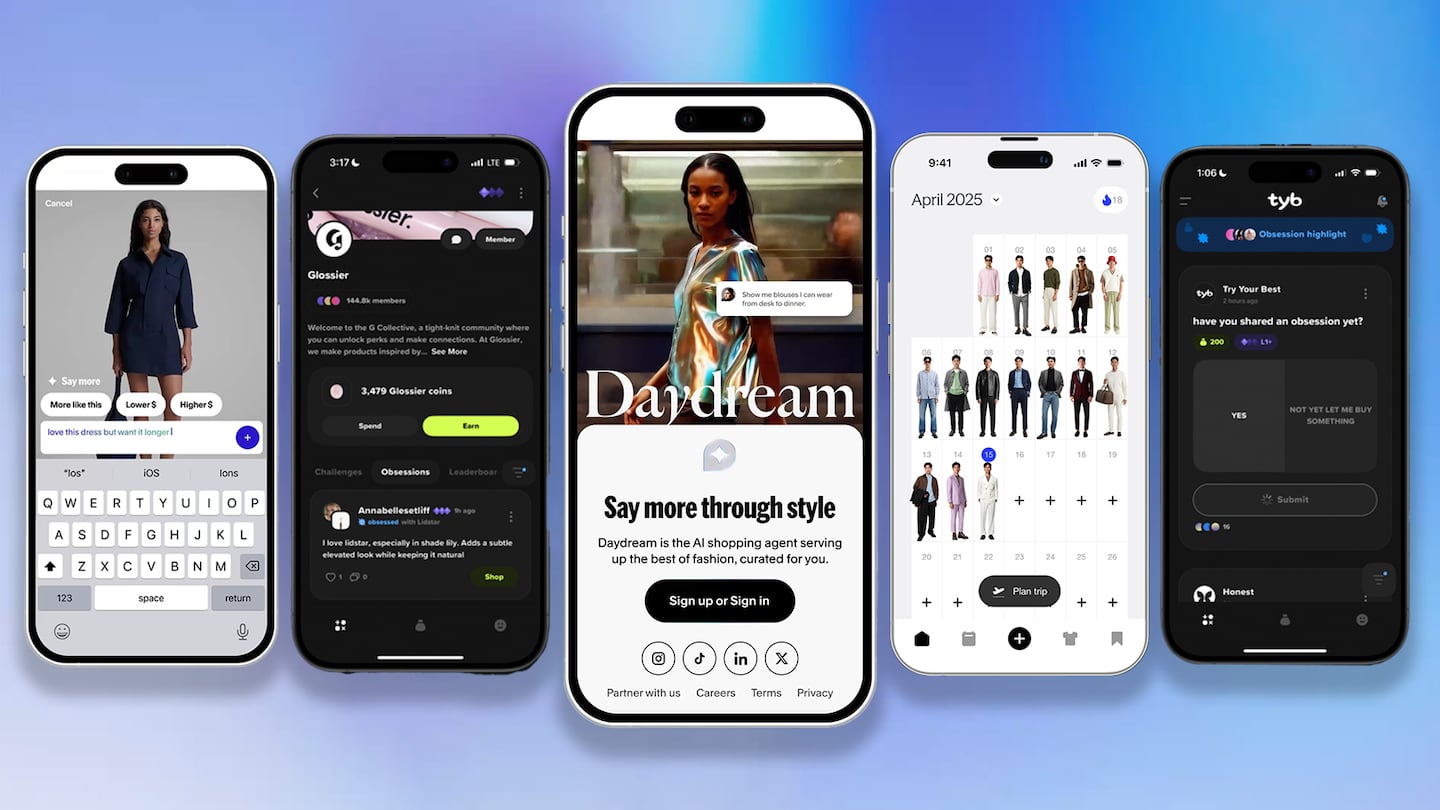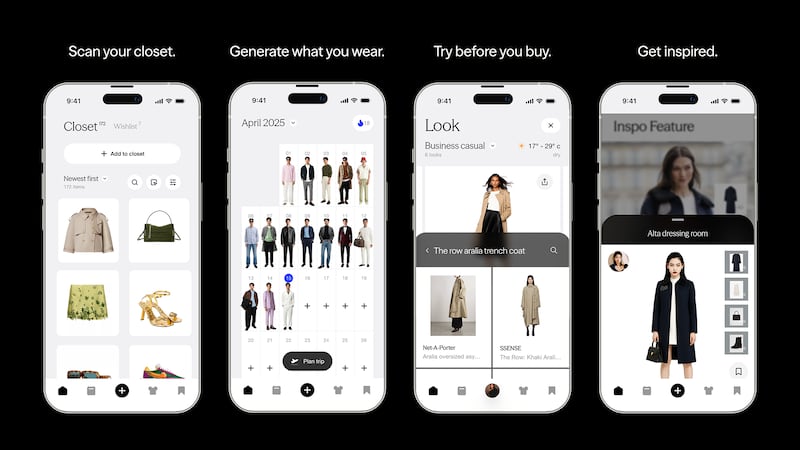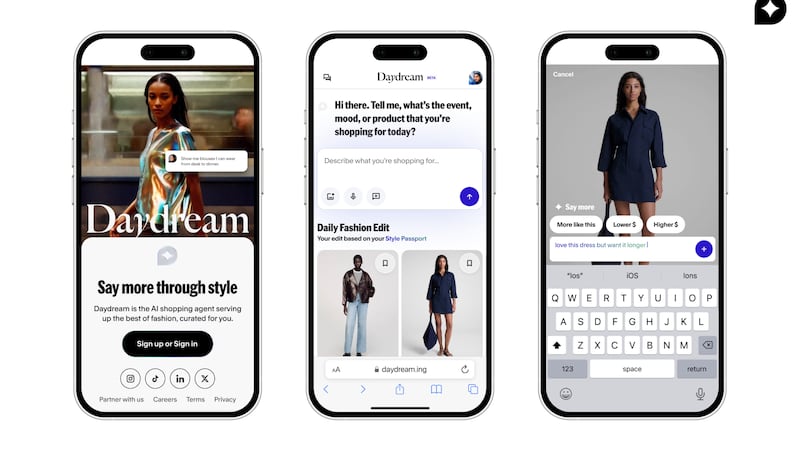Agenda-setting intelligence, analysis and advice for the global fashion community.
Alta was exactly what Amy Wu Martin was looking for.
Last year, Wu Martin, an investor at Menlo Ventures, was searching for a startup that used AI to address the lack of personalisation in online shopping. After being introduced to Jenny Wang and trying out a beta version of her personal styling app Alta — which suggests looks built from their existing wardrobes, akin to the virtual closet in the 1995 film “Clueless” — she wanted to help bring the app to the wider market.
“Every major e-commerce company probably has tried personalization to an extent, but doesn’t really know you,” said Wu Martin, who previously invested in AI-driven companies like Gen-AI video platform Higgsfield and mental health startup Slingshot AI. “Alta’s thesis is they need to understand what’s in your closet because that’s the starting point.”
It all led to Alta ultimately raising an $11 million seed round in June, led by Menlo Ventures, with participation from Aglaé Ventures, a venture firm backed by the Arnault family’s holding company Financière Agache.
ADVERTISEMENT
Alta’s fundraise is indicative of a wider trend among venture capitalists. The rapid adoption of AI is spawning a new class of startups that have encouraged Silicon Valley to give fashion tech — which they’ve sparsely invested in before — another look. In the past year, a number of startups that offer solutions for everything from design assistance to social shopping have collectively raised more than $100 million from serial tech investors like Thrive Capital, Menlo Ventures and Forerunner Ventures, among others. Luxury is also taking note of AI’s impact on fashion: This year’s LVMH Innovation Award winners, which go on to partner with the conglomerate’s brands, included AI-driven content creation studio Omi and Kahoona, an AI-powered customer data platform.
While 10 years ago, investors poured millions into e-commerce brands that pitched themselves as tech companies simply because they sold online, today they’re attracted to those attempting to solve industry pain points via technology, such as virtual try-on and personalised shopping. But they’re also the latest in a long line of businesses that have attempted to do the same and failed — it’s been 30 years, and there’s still no version of the “Clueless” closet that’s reached mass adoption.
Still, venture capitalists are convinced that reality has never been closer. To get there, they’re backing founders with rigorous tech chops, and unlike the DTC brands that were pressured to expand quickly, are more patient in helping new founders grow with gradual technological improvements.
“The nature of VC is that most of these companies will fail, and if anything has happened now … is that it’s much easier to build a product,” Wu Martin said. “The onus is really on the investor to really spend time with that founder; understand what the longer term defensible vision really is.”
A New Investment Philosophy
Investors today are less seduced by charismatic founders selling a dream — or fashion brands overselling their minimal tech capabilities. Instead, the companies securing funding have leaders with real expertise.
Wang, for instance, is a software engineer who worked for companies like DoorDash. Search and discovery platform Daydream, which raised $50 million last June, was co-founded by Julie Bornstein, a former chief operating officer at online styling service Stitch Fix, while Cheryl Liu, a former technical product manager at Amazon founded Gen-AI design platform Raspberry AI, which raised $24 million in January. AI-powered virtual try-on app Doji, which raised $14 million in May, was created by former Google machine learning engineer Jim Winkens and Dorian Dargan, who helped build VR games at Meta.
That experience allows founders to see both the big picture and the finer details of their businesses. Wang’s technical skills made it easier for her to fine-tune Alta’s software to improve the quality of its recommendations, according to Wu Martin; having a founder with those capabilities made her more confident investing in the platform.
“It was really important for us to find a team that was very AI native because we thought that actually solving the challenge of serving style is one of the hardest parts,” Wu Martin said.
ADVERTISEMENT
Investors are also keen on backing founders who have experience building similar platforms — particularly those that have already delivered for them. Bornstein, co-founder of AI-powered platform Daydream, which she describes as “ChatGPT for fashion,” previously founded the personalised shopping startup, The Yes, which went on to be acquired by Pinterest in 2022.
When the idea for Daydream first came to her, she reached out to Forerunner Ventures founder Kirsten Green, who had invested in The Yes. Green soon signed on as a partner, co-leading Daydream’s seed round last June with Index Ventures, and participation from Google Ventures and True Ventures.
“When it comes to AI, you really want to bet on a founder,” said Frédérique Dame, a general partner at Google Ventures. “When you find a founder that is as exceptional as Julie at understanding fashion intrinsically and how people shop, it’s really incredible to be able to invest early.”
Even fashion tech startups that don’t use AI explicitly are getting a lift from the excitement around its potential to change the industry. Alexa von Tobel, founder of venture firm Inspired Capital, for example, said she invested in affiliate marketing software platform ShopMy in December 2023, in part because she predicts that a boom in AI-generated content will push consumers to seek referrals from humans — be it friends or their favourite influencers.
Similarly, Try Your Best, a platform founded by Outdoor Voices founder Ty Haney that offers shoppers rewards from their favourite brands for sending referrals, posting about products and more, raised an $11 million Series A co-led by Strobe Ventures, which typically invests in Web3 companies, in June.
“The future of commerce will be more social, and there will be more real recommendations from real people, in a sea of a lot of noise,” Von Tobel said.
A Slow Burn
Founders that are trying to fundamentally change how people shop understand it will take longer to grow — and increasingly, so do investors.
“Now, companies are actually building a product with AI in mind in a way where you can push the agenda on personalisation and product discovery in a way you couldn’t do before,” Dame said. “It takes a while to build infrastructure that is flexible enough.”
ADVERTISEMENT
In the past year, Daydream reconfigured its system twice: it shifted from building its personalised search functions using OpenAI and receiving somewhat accurate results, to using multiple models, including Google’s Gemini, to improve its search engine, Bornstein said. The company went into beta testing last October and officially launched its platform last month.
“It’s a pretty complex system,” Bornstein said. “To build it so it sort of works is actually quite easy; to build it so it really works is actually quite hard.”
After launching, startups are introducing new features based on user demand in order to avoid building tools that won’t resonate. Alta, for example, started generating packing lists for users’ upcoming travel plans based on the city and climate after users asked for it. Later this year, it will begin recommending items a user needs to purchase ahead of a trip — another feature users requested, Wang said.
It’s not just making a product that works, but one that people will actually want to use. Last year, Alta was able to grow its user base to more than 10,000 after nabbing high-profile endorsements from investors like model Jasmine Tookes and television and podcast host Keltie Knight, but that is a miniscule number compared to the platforms people already go to for shopping and fashion inspiration: Instagram, TikTok and Substack. Getting more users to hop on board will likely be these apps’ biggest challenges moving forward.
“Is it super fun and intuitive and exciting and easy to use? Are you thinking about it after you close out the app?” said Mary Korlin-Downs, who tracks the latest developments in the sector via her Instagram account, All Things Fashion Tech. “Those are little factors that could totally set companies apart.”





